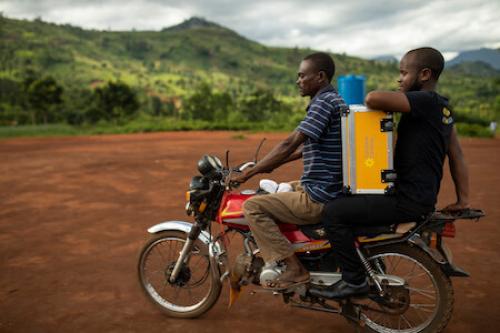 Often the best advances in technology aren’t those that grab the headlines. They’re the more mundane solutions that make things easier to use or more available to a wider audience.
Often the best advances in technology aren’t those that grab the headlines. They’re the more mundane solutions that make things easier to use or more available to a wider audience.
There’s nothing hi-tech about the Sunshine Cinema, for example, but advances as simple as smaller batteries, cheaper solar panels and the humble USB stick have powered its expansion across southern Africa. "Turning solar power into social impact" is the catchphrase used by Rowan Pybus, who co-founded the mobile cinema with his wife Sydelle Willow Smith 10 years ago.
The idea is simple, but the effect on some people’s lives is enormous. Youngsters are trained and given a SunBox so they can screen films or documentaries in a classroom, a community centre or anywhere with space for people. We’re not talking about Marvel blockbusters, but films with a conscience that highlight issues including conservation, mental health, equality and gender-based violence. After the free screening comes a discussion to spark conversations about these important issues.
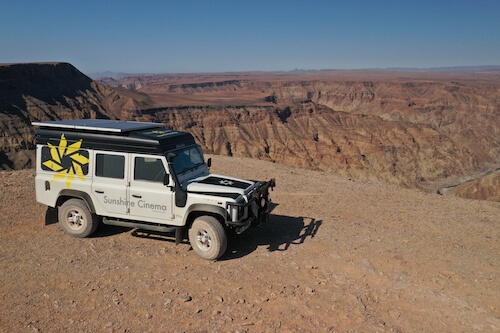 So far it’s operating in South Africa, Zambia, Zimbabwe and Malawi through more than 80 ambassadors who have screened 300 African films to half a million people, often in poor or under-served communities.
So far it’s operating in South Africa, Zambia, Zimbabwe and Malawi through more than 80 ambassadors who have screened 300 African films to half a million people, often in poor or under-served communities.
The idea was a spin-off from Makhulu, an ‘ethical publicity company’ that Rowan founded to work with organisations like the United Nations, Doctors Without Borders and Conservation International. Makhulu produced a documentary in Zambia about the alarming rate of deforestation, featuring a reformed logger who had started growing trees instead. “His story was so poignant that we made it for free and put it out on the internet,” says Rowan. The film won several awards and received support from the UN and National Geographic. But that wasn’t getting it seen where it needed to be seen, so Rowan and Sydelle used $1,000 that National Geographic had given them to hack together the first solar-powered cinema in a box.
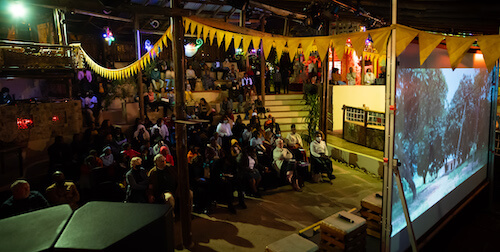 Then they bought an old Land Rover and installed a solar system and a big screen, so they could drive to different communities, show a film, and train a young person there to keep the momentum running.
Then they bought an old Land Rover and installed a solar system and a big screen, so they could drive to different communities, show a film, and train a young person there to keep the momentum running.
The first SunBox had a lead acid battery and needed wheels to be moved around, he remembers. “It weighed 25-30kg so it was diabolically heavy. Then lithium-ion batteries came out and brands pivoted towards lithium-ion battery packs. We can thank the cellphone revolution for that.”
Another vital change was the steady decline in the cost-per-volt of solar power as solar technology advanced. “Some ex-Apple designers started a company called Jackery and the best mobile solar system on the planet right now is Jackery. They’ve been very supportive of what we do and we design our SunBoxes around their product,” Rowan says.
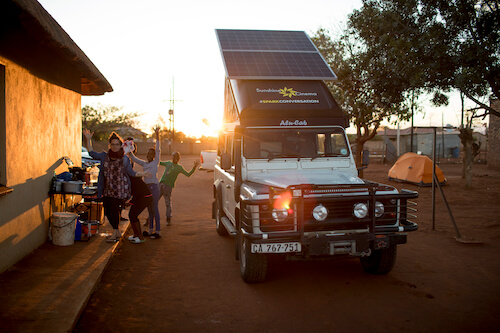 That solar power runs a small, powerful battery-charged HD projector made by AAxa, while the films themselves are stored on 64GB USB sticks supplied by Sandisk, which slot into the projector.
That solar power runs a small, powerful battery-charged HD projector made by AAxa, while the films themselves are stored on 64GB USB sticks supplied by Sandisk, which slot into the projector.
Other advancements have boosted the sound quality, with speaker manufacturer JBL supporting Sunshine Cinema since the beginning. “Their Bluetooth speakers have gotten better and smaller and louder and more bassy,” says Pybus. “We’ve been grateful for the technological advancements in each sector and the support of these incredible partners that are pushing technology forward in their own product development. We just put it all together in a SunBox and let young people turn it on.”
The initiative is also supported by countless filmmakers, and the young facilitators swear allegiance to the filmmakers and guard their USB sticks to prevent piracy, because they recognise that they’re holding the art and efforts of someone’s creativity.
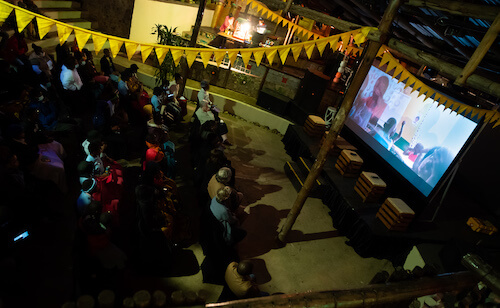 When a screening is planned, the ubiquity of cellphones and Whatsapp allow the organisers to amass an audience, and there’s an event being held somewhere every day. Its growth across southern Africa is partly thanks to a 6-month online course run with the University of Cape Town to teach ‘film screening impact facilitation’. In other words, how to show a film and spark meaningful conversations.
When a screening is planned, the ubiquity of cellphones and Whatsapp allow the organisers to amass an audience, and there’s an event being held somewhere every day. Its growth across southern Africa is partly thanks to a 6-month online course run with the University of Cape Town to teach ‘film screening impact facilitation’. In other words, how to show a film and spark meaningful conversations.
Sunshine Cinema also runs an online Spark Impact Program to build on that with additional training and work experience, then the trainees are given a SunBox, a Canon camera and a laptop and paid to go out and screen.
Another initiative was a workshop in Bulawayo, Zimbabwe, to train storytellers to shoot short films on their phones. That’s encouraging more content to be produced in local languages about relevant issues, augmenting the material from professional filmmakers or Makhulu. “We have the support of the filmmaking communities, but we add our own films where we think they suit a certain region or tear into an issue. We’re grateful that it’s become so easy to do that through technology,” Rowan says.
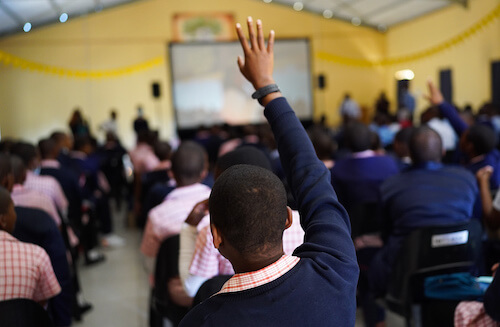 Some of the team have also learned to create podcasts for a series called The SunCloud, covering topics including sexual violence, gender inclusivity, false information and mental health awareness.
Some of the team have also learned to create podcasts for a series called The SunCloud, covering topics including sexual violence, gender inclusivity, false information and mental health awareness.
Fake news and misinformation are a growing concern for the team. “We’d like to see a lot more being done to help young people discern facts from fiction,” Rowan says. “AI is going to play a part in that, but AI is also going to be a problem. What is a meaningful film and what is a piece of propaganda created to manipulate you to make a decision that’s not beneficial to you or your community?”
These issues around content are currently the main focus, because on the IT side, Rowan doesn’t predict any upcoming changes. “The best thing we can do is lighten the load on the young person and have more power in a smaller unit, but the advances that we’ve seen have been a big leap, so I don’t see the battery technology getting smaller any time soon.”
First published in Brainstorm Magazine. Photos: Supplied by Sunshine Cinema